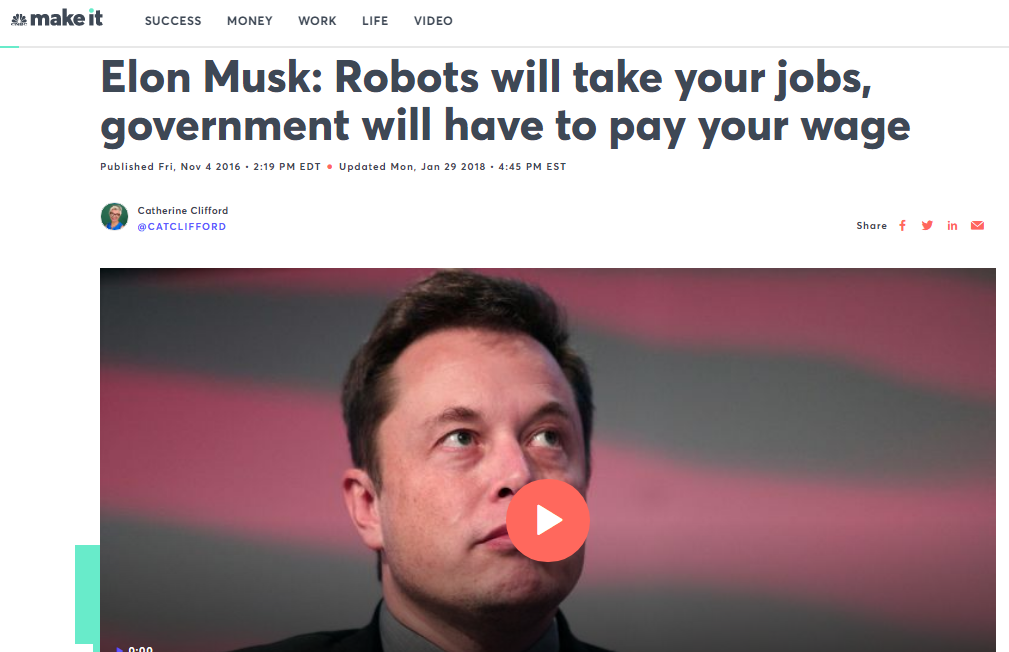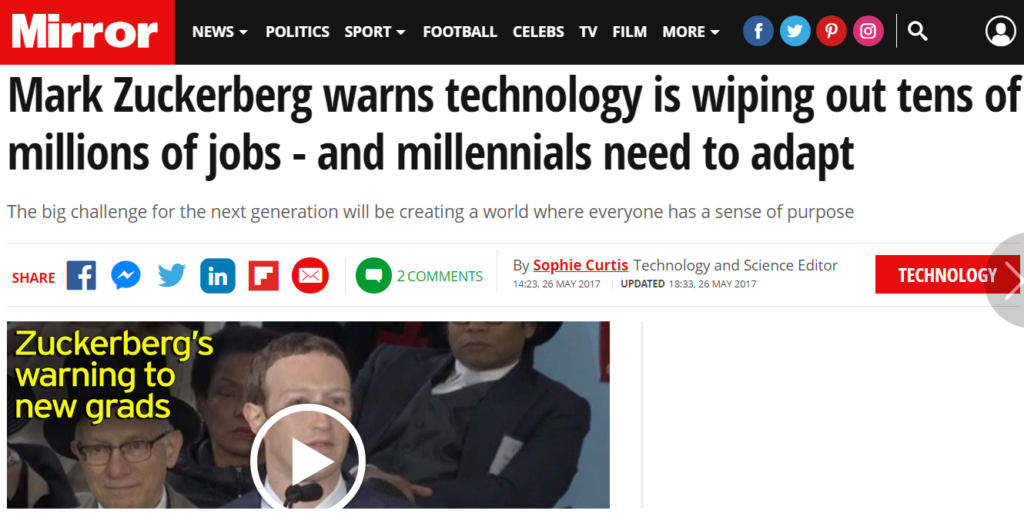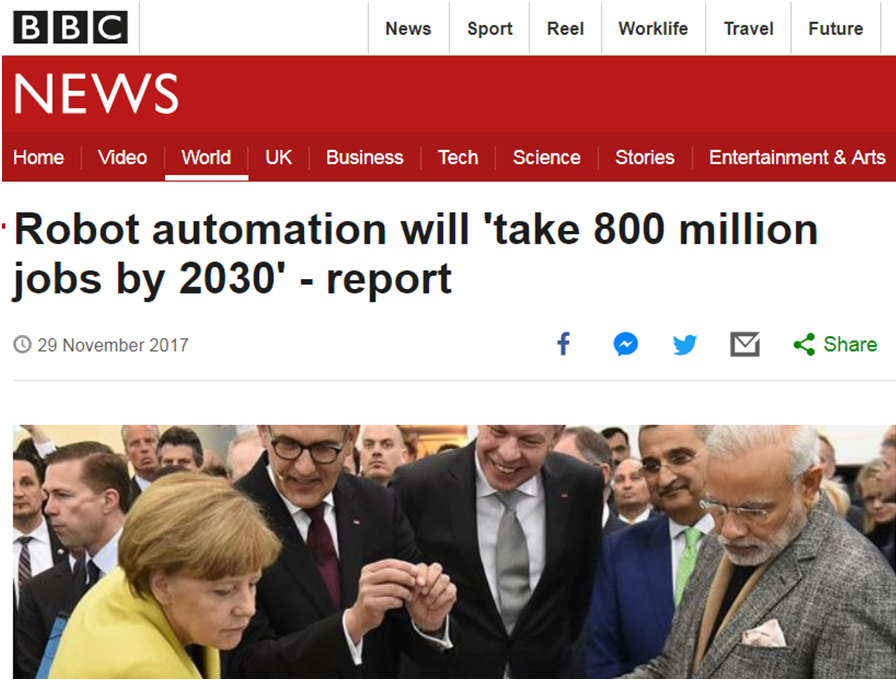In the past few years, apocalyptic forecasts regarding the ‘future of work’ have regularly been hitting the headlines. From the Silicon Valley’s Mark Zuckerberg and Elon Musk – to leading consulting groups such as McKinsey and PricewaterhouseCoopers, major economic players have been consistently issuing alarming statements. So, are robots really going to take over our jobs?
Distasteful sensationalism or pragmatic warning? An ambitious McKinsey study on the ‘future of work’ published at the end of 2017 has found much echo in the press internationally. The question of what role artificial intelligence (AI) is destined to play in this revolution, however, seems to have remained somewhat of a media blind spot…
As early as 2013, an Oxford University study had asserted that some 47% of US jobs were at “high risk” of being automated “in the next decade or two”.
An assessment that would very quickly receive the backing of PricewaterhouseCoopers, according to which 38% of all US jobs might purely and simply disappear “by 2030” !

“What’s going to happen is that robots will be able to do everything better than us… I mean all of us. The robots will be able to do everything.”

Mark Zuckerberg’s Harvard prophecy: get prepared for a world without work – and for universal basic income!
Similarly, Deloitte’s UK subsidiary had already warned in 2016 that 35% of all British jobs were “at high risk of automation in the next 10 to 20 years”…
More recently, McKinsey announced the ‘displacement’ of 1-1,2 million jobs by 2030 in Switzerland. Which happens to represent 20-25% of the nation’s total jobs market… and we are only talking here of a ‘midpoint scenario’!
Indeed, according to the distinguished consulting group, the “automation potential” in our economies is quite staggering: 56% in Japan (35,6 million jobs), 50% in Italy (11,8 million jobs), 48% in Germany (20,5 million jobs), 47% in Switzerland (2 million jobs), 46% in the US (60,6 million jobs), 43% in France (9,7 million jobs) – as well as in the UK (11, 9 million jobs)… A fantastic opportunity of profit margin expansion for (big) companies, which may end up sparing trillions in wages every year (p.9) – of which:
- $2,7 trillion/year in the US
- $1,7 trillion/year in Europe’s ‘big Five’ (Germany, France, UK, Italy, Spain)
- $1,1 trillion/year in Japan
- $1,1 trillion/year in India
- …
And this, solely with the help of the technologies already available today…
Discussing mass automation in Davos: not necessarily bad news for everyone…
Now, our reader may be prepared for the stern warning that the founder of the high-profile World Economic Forum had issued in the Swiss press in January 2016: “People who are performing administrative tasks – like those working in the banking sector – will lose their jobs“.
A good reminder of the fact that the phenomenon of “automation” is due to massively impact the services sector – through the ever greater use of ever more capable AI…
When blockchain meets AI: hard times ahead for the middle classes…
The promises and threats of the “AI revolution”
But the banking sector certainly won’t be the only industry to massively benefit from the AI revolution. In 2016, a Deloitte report dedicated to ‘the future of automation in the UK business services sector’ offered some spectacular examples:
“Studies conducted by the London School of Economics have shown [that] for example a telecommunications company [Telefonica] that automated 160 different processes, achieved a return on investment that ranged between 650% and 800%.
Another example comes from a software company that is investing heavily in creating a digital workforce. IPsoft’s virtual engineers can handle nearly 60% of all incidents without the need for human intervention. The remainder are escalated to a human specialist.”
Since 2014, IPSoft has been striking one strategic partnership after another: with Accenture, UBS, Credit Suisse, Shell, Amazon… Most notably, this extremely discrete company (it isn’t even listed on the stock exchange!) has rolled out a “digital assistant” destined to “do the work of back-office accountants and call-centre workers”
In May 2018, Google rolled out its Duplex assistant in front of a cheering crowd at its corporate headquarters in Mountain View, California. A not-so-much-talked-about piece of software that could sooner or later make the professions of call center & customer support agent totally obsolete…
This is precisely what SAP explains – in quite an amusing way – about its own “intelligent enterprise solutions”. Their conversational AI software is able to listen to customers, provide them with the requested information – and learn from its experiences!
Having now made the point that a large-scale replacement of services sector jobs through AI technology is a very concrete possibility, a most difficult question arises: do business services jobs still have a future?
We will try to provide the reader with a satisfactory answer in our next publication…
First published on August 8th, 2019
By Vincent Held, co-founder of HR4free and author of the book ‘Après la crise’ (After the Crisis), which addresses this issue.










